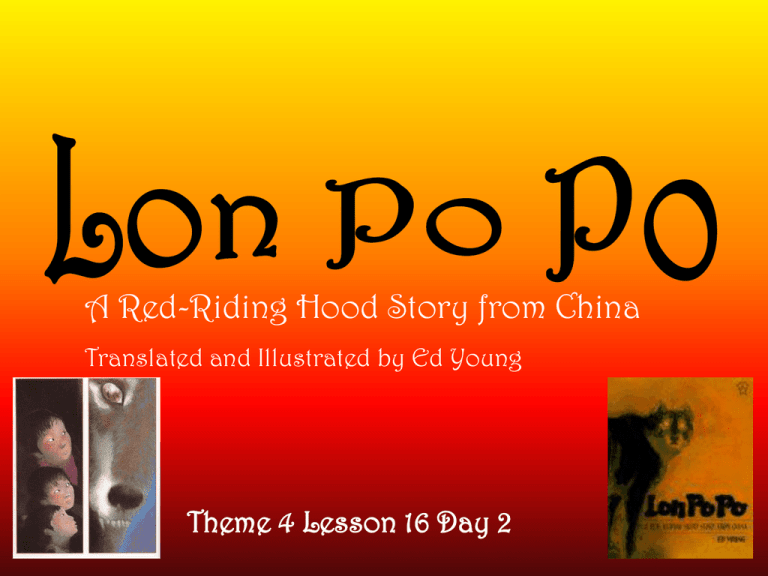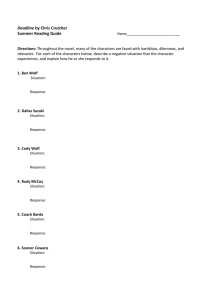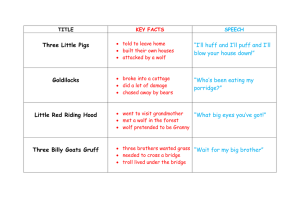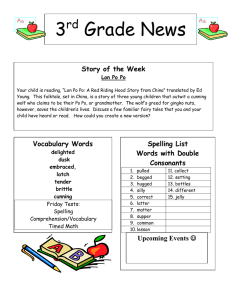A Red-Riding Hood Story from China
advertisement

A Red-Riding Hood Story from China Translated and Illustrated by Ed Young Theme 4 Lesson 16 Day 2 Remember that one of the easiest ways to solve a problem is to ask for help. Try to think of a time when someone asked you for help. Maybe your helped someone find a backpack, build a science project, or helped them pronounce a word they didn’t know. Someone once asked me for help with _______. You will need to add two or three sentences about what happened-what the person needed help with, how you were able to help, how you felt about it and so on. T38 Oral Language Read Aloud Today we are going read a poem “A Helping Hand”. Why might we read or listen to a poem? We might read a poem for enjoyment, to learn something new, or to listen to the way words sound. As you listen to the poem listen for striking or exact language that the poet uses. T 39 Transparency T105 T Transparency R105 Discuss the Poem How are the fish, bird, and dog alike? What are some examples of exact language in the poem? Which words in the poem rhyme? T 39 Transparency R79 Words with or, ore ^ can be spelled with several different letter Remember that words with the /or/ sound combinations, including or, ore, our, ar, and oar. Look at these words and who can tell me the letter combination in each word that stands for the /or/ sound. ^ 1. wore 2. sport 3. form 4. sore 5. score 6. force 7. story 8. before 9. bore 10. glory T 40 Independent Practice In your note book make this chart and group the words in the chart. or 1. wore 2. sport 3. form 4. sore 5. score ore 6. force 7. story 8. before 9. bore 10. glory T 40 Independent Practice or 1. sport 2. form 3. force 4. story 5. glory ore 1. wore 2. sore 3. score 4. before 5. bore T 40 Identify Sounds Remember that both the or and ore can stand for the sound ^ of these words to yourself. /or/. Read each for more Notice that both words have the /or/ sound and the two words rhyme even though one has a silent e^ at the end. You just have to memorize spellings of words that have the /or/ sound spelled with or or ore because there is no good rule when a word has a final e. ^ T 400 Spelling Patterns Write at least two pairs of rhyming sentences that use /or/ words from the list you made with or and ore words. After you have finished then exchange your papers with a partner and share the rhymes. I will call on a few to share with the class in a few minutes. T 41 Robust Vocabulary Would a person wearing a wig and mask be disguised? Would it be cunning of a fox to steal a farmer’s eggs? Explain When might two people have embraced? What would it be like to eat tender meat? What might happen to brittle toast when you butter it? When are you delighted to see a friend? T42 Develop Deeper Meaning Read pages 18 and 19 in you book to yourself. Now read page 18 aloud with me and then answer my questions. T 42 Would Granny like to eat a chick sandwich that was not tender? Explain Why would Granny be delighted to see her grandchild? What would happen to Granny’s brittle bones if she fell? How did the girl feel when her mother embraced her? T 42 Develop Deeper Meaning Now read page 19 aloud with me and then answer my questions. T 42 In what ways was the wolf cunning? How did the hunter know that the wolf was disguised as Granny? T 42 Now let’s read the genre study. Fairy tales take place in a make-believe world. Many fairy tales have been retold for centuries in different forms. In most fairy tales, characters are clearly good or bad. Sometimes the characters are talking animals. Some characters may have unusual or special powers. T 44 Can someone think of a fairy tale where a character in them was trying to trick children? The wolf from ”Red Riding Hood” . Fairy tales almost always have a happy ending. Now let’s copy the graphic organizer from the genre study and use it as you read the story. T 44 Comprehension Strategy Read the strategy information on page 20. When readers have trouble understanding what is happening in a story, they often read ahead. Learning about what happens next may help the reader make sense of the story. Then he or she can return to the confusing text and read it correctly for understanding. T44 As we read the story you are going to keep track of how the characters are alike and how they are different and then we will answer the questions. T44 Now let’s look at pages 20 and 21 You will read a story in which three children solve a problem creatively. Can someone tell me how you solved a problem in a creative way? One purpose for reading a fairy tale is for enjoyment. Look at the title and the author’s name. * To what fairy tale do you think “Lon Po Po” will be similar? Why? “Red Riding Hood” because part of the title says that it is A Red Riding Hood Story from China. * What do you think this story will be about? Perhaps it will be about a wolf that tries to eat some people. T45 Now let’s read pages 22 and 23 Where is the mother going? She is going to see the children’s grandmother. When should the children close and latch the door? They should close and latch the door at sunset. T46 Now let’s read pages 24 and 25 How are the wolf and the mother different? The mother is described as “good.” The wolf is tricky and disguises himself as an old woman. What does the name “Po Po” mean in Chinese? gandmother What is the wolf like? How do you know? Tricky, dishonest, and dangerous and I know this because he disguises himself, wolves in fairy tales are often bad. How does the wolf try to fool the children? He pretends to be Po Po. He gives answers that sound as if they could be true. T47 Now let’s read pages 26 and 27 Why do the younger children let the wolf in? They cannot wait to see their grandmother. The author says the wolf is cunning. What details support this idea? The wolf disguises himself; he pretends to be surprised that the mother is not home; he answers questions as the grandmother might; or he blows out the candle. What do you think the wolf will try to do? Why do you think that? He will try to eat the children, because that’s what the wolf in Red Riding Hood does. T48 Now let’s read pages 28 and 29 Why does the wolf pretend to be sleepy? He pretends to be sleep so he can get the children to go to sleep and then eat them. How does Shang learn that the wolf is not really her grandmother? After she touches the wolf’s tail and claws, the light and catches sight of the wolf’s hairy face. Why do you think Shang asks the wolf about gingko nuts? Shang has a plan for getting away from the wolf and the nuts are part of the plan. T49 Now let’s look at pages 36. 1. How are Shang and the wolf alike? How are they different? Shang and the wolf are clever. The wolf is greedy; Shang is brave. 2. Why does the wolf get into the basket? The wolf wants gingko nuts from the tree. 3. Which story do you find more interesting, “Lon Po Po” or the read-aloud story “Little Red Riding Hood?” Why do you feel as you do? I think “Lon Po Po” is more interesting because Shang outsmarts the wolf. It was also interesting to read a story set in China. T53 Now let’s read pages 30 and 31 How is Shang different from her sisters? She is the eldest; she is more clever; she is the one who discovers that the wolf was lying and thinks of a plan to trick the wolf. What do you think Shang and her sisters will do with the basket? Why do they want to pull the wolf up into the tree with them? They might drop something on the wolf; they might put the wolf into the basket and pull it up into the tree and drop it. T50 Now let’s read pages 32 and 33 How does the wolf feel about going in the basket after the first time he falls? He wants to go in again because he really wants to taste a gingko nut. What does the wolf do? He gets a basket and rope and lets the girls pull him into the tree. The basket falls twice and the wolf becomes angry. Why do you think Shang lets the wolf fall the first two times? It is part of her plan; to scare him; to hurt him. T51 Now let’s read pages 34 and 35 Why does Shang cough? It is a signal to her sisters that it is time to let go of the rope. Why do the girls climb down to the branches just above the wolf? They want to stay away from the wolf if he is pretending to be hurt or dead. What lesson does the story “Lon Po Po” teach? You need to listen to you parents and be careful about whom you let into your home. T52 4. How can you tell that the author likes the characters of Shang and her sisters better than the wolf? The author tells how clever Shang and her sisters are. The wolf dies. 5. What made Shang suspicious that the visitor was not her Po Po? Use examples from the story to support your answer. Shang noticed the wolf’s voice, tail, and claws. She saw the wolf’s face. T53 Now let’s look at pages 37 and learn about the author and illustrator. Ed Young has illustrated over forty books for children. Born in China himself, Ed Young gets inspiration from Chinese paintings. He also does a lot of research before he begins illustrating because he wants his pictures to be exciting and believable. T53 Check Comprehension Retelling Comparing and contrasting characters, settings, and events can help readers better understand the stories they read. How are Tao and Paotze in “Lon Po Po” alike and different. They are alike because they are both Shang’s younger sisters. They are different because Tao is plump and Paotze is sweet. Now you will use the graphic organizer you made before we started reading the story to help you summarize “Lon Po Po”. Remember that your summaries should tell the important events. T54 Fluency Accuracy As you read you should read at a comfortable rate and read each word accurately and clearly. Since some words may be spelled almost the same as other words that sound different or have different meanings, it is important to look at each word carefully. T54 Fluency Accuracy Now you are going to follow along as I read page 22 in “Lon Po Po.” T54 Practice/Apply Now you are going to echo-read page 24 with a partner. Emphasize clear and accurate reading. T54 Build Robust Vocabulary brittle - things that are stiff and hard and that break easily charming - you have a way of pleasing people with what you say and how you act cunning - to use smart and tricky ways to get what you want delighted - when you are very happy about something disguised - when you are wearing something that keeps people from knowing who you are embraced - to hug someone Shang was ingenious when she thought of a plan to trick the wolf? Which would be an ingenious invention – a flying bicycle or a rolling bicycle? T 55 Build Robust Vocabulary ingenious - when you do something clever or imaginative outwit - when you trick someone by doing something clever racket - making a lot of noise tender - something like food that is soft and easy to chew of cut The sisters outwit the wolf when they get him to climb into the basket. Would you be more likely to outwit someone if you were playing “hide and seek,” or jumping rope? T55 Build Robust Vocabulary ingenious - when you do something clever or imaginative outwit - when you trick someone by doing something clever racket - making a lot of noise tender - something like food that is soft and easy to chew of cut Practice/Apply * Think of ingenious ways to have fun on a rainy day without using a computer or a video game. Why is your plan ingenious? * Discuss with a partner different possible ways of outwitting someone during a game of tag. Make a list of your ideas. Compare your list with that of another pair of students. T 55 GRAMMAR Adjectives Adjectives are words that describe nouns – people, places, and things. Many adjectives tell what kind. For example, these adjectives can tell about the color, size, shape, smell, age, or temperature of something. The young girl saw a brown bear in the woods. In this sentence young tells what kind of girl the subject is, and brown tells what kind of bear the object is. T 56 Guided Practice The dog small ran away. Who can tell me what kind of dog this sentence is about? small The adjective in this sentence is not in the correct place. Who can tell me where it should go? The small dog ran away. T 56 Practice/apply The cat climbed the tree. In your notebook write a list of five adjectives for each noun in this sentence. For cat - small, yellow, black, large, striped; For tree – big, towering, young, tiny, green Now you are going to choose two that you think will work best and rewrite the sentence using those adjectives you wrote. After you finish your sentence then share them with your partner and I will be calling on someone to share theirs with the class when we have finished.T 56 DOL Write and correct each sentence. 1. she were a girl tall 2. i saw a bird white threw my window? T 56 Writing Character Sketch Prewrite Analyze a Character Reread page 29 of “Lon Po Po.” The way the author described Shang and the wolf and their actions helped make the story fun to read. T 407 Conventions Look through “Lon Po Po” and find four names of characters that have been capitalized and write them in your notebook. Now we are going to make a chart together about the characters you wrote. How (Character’ Name) Looks and Sounds How (Character’ Name) Acts What (Character’ Name) Is Like T 407 How (Character’ Name) Looks and Sounds How (Character’ Name) Acts What (Character’ Name) Is Like We can use some adjectives to help complete the first and last columns. T57 How (Character’ Name) Looks and Sounds How (Character’ Name) Acts What (Character’ Name) Is Like Now you are going to create a character you would like to write about and then prepare for writing by making a chart like this one for your character. Save your work for use on Days 3-5. T57


